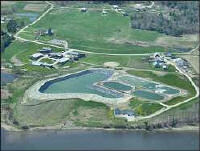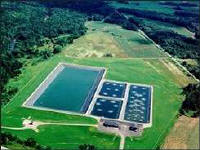 |
|
 |
| Mission | Search | Acknowledgements | Discussion Group | Contact Us | Links | ||
| ||||||
|
Maine DEP Monthly
Maine and WEF's
Penobscot Watershed and Development of a TMDL
Maine Rural Water
Maine
Wastewater Control Association |
Composting Municipal Wastes
Background Simply stated, composting is the biological decomposition of the organic constituents of wastes under controlled conditions. The term "decomposition" is used instead of "stabilization", because when applied to a practical usage, the process is rarely carried on to the point at which the waste is completely stabilized. the term "biological" distinguishes composting from other types of decomposition, such as chemical or physical. Organic is applicable because, with few exceptions, only the organic portion of wastes is subject to biological breakdown. A very important term in the definition of composting is "controlled". It is the application of control that distinguishes composting from the natural rotting, putrefaction, or other decomposition, that takes place in an open dump, a sanitary landfill, in a manure heap, or in an open field. Principles Probably all of the principles involved in composting wastes can be traced to the single all inclusive fact that composting is a biological process. Two broad inferences can be drawn from this fundamental: (1) Composting has the limitations of biological systems; and (2) The process is affected by the basic environmental conditions that influence all biological activity. Classification Compost systems can be classified on three general bases: oxygen usage, temperature, and technological approach. Oxygen usage is divided into aerobic and anaerobic. When temperature serves as the basis, the division becomes mesophilic and thermophilic. Finally, using technology as the key, the classification is divided into static pile or windrow, and mechanical or "enclosed" composting. Aerobic composting involves the activity of aerobic microbes, and hence the provision of oxygen during the composting process. Aerobic composting generally is characterized by high temperatures, the absence of foul odors, and is more rapid than anaerobic composting. Anaerobic composting is characterized by low temperatures, the production of odorous intermediate products, and generally proceeds at a slower rate than does aerobic composting. In mesophillic composting the temperatures are kept at intermediate temperatures (15 degrees to 40 degrees C.), which in most cases is the ambient temperature. Thermophillic composting is conducted at temperatures from 45 degrees C to 65 degrees C. Essential Factors Briefly stated, essential factors are those features of the physical, chemical, and biological background that are necessary to the establishment and proliferation of the microorganisms specific to the desired process. Five essential factors that have become key design features in recent compost technology are suitable microbial population or populations, aeration (oxygen availability), temperature, moisture content, and carbon availability. Municipal Sludge The four most common methods for composting sewage sludge are aerated static pile, windrow, aerated windrow, and in vessel. Most municipalities are composting a dewatered sludge or sand bed dried sludge. Belt filter presses appear to be the most common type of dewatering system used. The general climate for for sludge composting is healthy. More cities are turning to composting because of the public's perception of recycling. As it gets increasingly difficult to site combustion facilities, and where land application is not feasible, composting is becoming the preferred method for handling sewage sludge. Sludge Composting Facilities in Maine
|
|